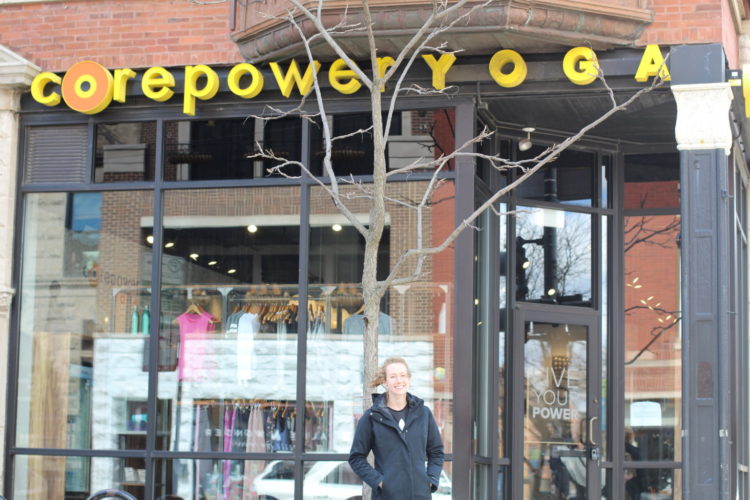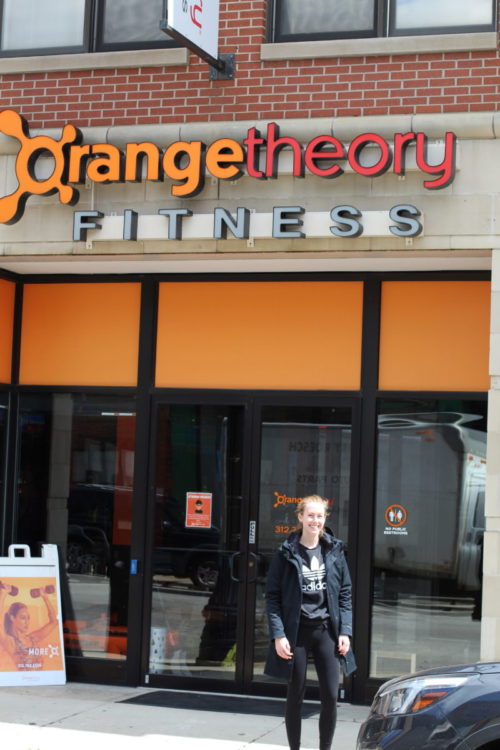
“It’s not about the workouts. It’s about the experience.”
Everyone knows that working out and staying active are important elements in maintaining a healthy lifestyle, and select fitness brands have taken this to the next level. Brands like SoulCycle, CorePower Yoga, and Orange Theory not only offer highly-trafficked and well-known group fitness classes, they have also built fiercely loyal cult-like communities. To put these brands to the test, I tried group fitness classes at each of these three fitness studios.

The first was SoulCycle. When you think cult fitness, SoulCycle should be one of the first brands that come to mind. Founded in 2005, SoulCycle’s mission statement is, “to bring Soul to the people. SoulCycle instructors guide riders through an inspirational, meditative fitness experience designed to benefit the body, mind, and soul. Set in a dark, candlelit room to high-energy music, riders move in unison as a pack to the beat and follow the cues and choreography of the instructor. The experience is tribal. It is primal. And it is fun.”
As you can see, SoulCycle makes no qualms about their desire to create a cult-like community of riders held together by, as they describe, an “unshakeable bond.” SoulCycle lover and 6sense CMO, Latane Conant, says, “I love SoulCycle because it is an experience beyond just a workout.” And this is true. SoulCycle ensures that their inspirational and meditative classes leave riders feeling empowered and ready for more. It is clear in their brand messaging that SoulCycle is not in the business of selling group fitness classes, they are selling feelings of empowerment, enlightenment, and belonging.
In the back of my mind, I had always told myself that one day I would take a SoulCycle class. Having worked out of the Merchandise Mart for almost two years, I had walked past the nearby Chicago SoulCycle studio several times. Every time I passed by, I experienced a sense of curiosity and fear. I’d heard the classes were tough, but I also thought that most of the attendees in any given class would be far more experienced and fit than myself. So, as I finally crossed the bridge to enter the SoulCycle studio for the first time, I was quite nervous.
After checking in, signing paperwork, and renting shoes, I headed into the studio. A SoulCycle employee led me through the dark studio and helped me clip into my bike. The first thing I noticed was that the bikes didn’t have any display, only an unmarked knob to adjust resistance. Riders cannot track their distance, calories burned, or resistance levels. At first, I was surprised that SoulCycle’s bikes weren’t more high-tech, but it soon began to click for me that SoulCycle seems far more focused on the rider experience than data tracking.
As the door closed, the studio became very dark, lit only by a few candles in the front of the room surrounding the instructor. The instructor’s bike was fixed to an elevated platform, along with a table holding a laptop for her to control the music, and switches to control the lights. As the class began, the loud music, cheering from riders, and dancing and yelling from the instructor, all made the experience feel more like a concert than a workout class.
In the end, the class kicked my butt. I was beet-red for at least an hour afterward, but it wasn’t as complicated of a class as I was expecting. However, just like my realization about the lack of displays on the bikes, I realized that SoulCycle likely doesn’t want to be known for complex choreographed workouts. Despite the high price tag on classes, SoulCycle is not about elitist, complicated classes. It is much more about a sweat-soaked community of people who love and feed off of the energy of others in the room. Zakery Kates, Simple Edge Founder, fitness junkie, and fellow SoulCycle lover said, “I was never bothered by the steep price of SoulCycle because the classes always felt like an experience. When I go I make a special event out of it. I never go alone, I always go with a friend because SoulCycle is a party.”
Realistically, I think I could replicate a SoulCycle workout in a gym by myself, but I could not replicate the experience, the atmosphere, or the energy of the group, and this is what continues to bring people back to the studio and keeps them invested in the community.

Next was CorePower Yoga. CorePower Yoga is the largest privately held chain of yoga studios in the US, with over 200 locations. CorePower spends surprisingly little on traditional advertising and relies mainly on word-of-mouth marketing. They will often invite people from “like-minded businesses,” in the hopes that they will tell others about their experience.
Of the three group fitness classes I took, I was the least nervous about Core Power Yoga. I have taken yoga classes before and, although I would not call myself a yogi by any means, I am comfortable with basic poses.
After spending about 15 minutes online trying to figure out how to book a class, I realized that few CorePower studios require or take spot reservations, and all Chicago locations are drop-in. I believe this is a double-edged sword, considering the immense following CorePower boasts. While this system allows customers the flexibility to base their attendance on their personal schedules, it can backfire when a popular class has an overwhelming number of attendees. This is what happened to me. I signed up for yoga sculpt class that was clearly very popular, and 60 people were packed into a tight, hot studio.
It seemed that most of the attendees knew each other and the instructors. While we waited in the lobby for the class to start, many of the attendees were catching up with each other, talking about previous/future classes, or taking photos together. As we filed into the studio, I realized that 60 people were way too many to comfortably fit. There was no room between mats, which immediately made me think that CorePower could do a better job of capping their classes at a certain number and turning away latecomers. However, it also made me realize what an immense following they have. With several classes per day and many locations around the city, the first class I attended was fully packed. Despite the close vicinity to every other sweaty attendee, the class itself was amazing. The yoga sculpt class lived up to its reputation – it was exhausting yet rewarding.
Since the registration for CorePower included a free week, I was able to take several classes, all of which were heavily trafficked. To me, the community at CorePower seems less intense than the community at SoulCycle, likely due to the type of workout involved. However, the group seems just as loyal, considering that I saw several of the same faces at every class I attended.

The last stop was Orange Theory. I didn’t know what the expect at Orange Theory, since the workouts always change. Unlike CorePower or SoulCycle, I didn’t walk in knowing I would be doing either yoga or spin.
When you’re new at Orange Theory, you have to arrive a minimum of 30 minutes early to meet with a coach, fill out paperwork, and get debriefed on how the workout will run. When I learned this, the intimidation factor set in. However, when I did arrive early, the OrangeTheory trainers were incredibly welcoming and informative. They explained that the class would be broken into two groups and we would switch workouts halfway through. Half the group started on treadmills with an interval running workout, while the other half went back and forth between rowing and floor exercises. Every attendee wore a heart rate monitor that projected their name, calories burned, heart rate, and heart rate zone onto screens throughout the studio. Unlike CorePower or SoulCycle where you stay on your mat or your bike, there was a lot of moving around and listening for direction from the instructor for your specific group. While it was intimidating, I was able to follow along more easily than I expected.
An article in FastCompany explained that Orange Theory offers an, “Intimidating yet accessible regimen, which perhaps explains its cult status – 700,000 members and climbing. The nine-year-old company says it is the fastest-growing fitness franchise in the world, with 875 studios across the US and 999 worldwide.” To emphasize the community further, every single Orange Theory studio offers the same workout each day. While the day to day workouts always change, if you go in for a class, you know that OrangeTheory attendees worldwide will be following the same workout as you that day. I appreciated this about OrangeTheory. Similarly to CorePower and SoulCycle, they are cultivating a community, OrangeTheory is just extending that even further.
After completing all three classes, it was interesting to reflect on how different they had all been, and how different their customer bases were. Besides possessing a passion for fitness, I saw little overlap in the type of customers at each studio. All three companies have been able to build highly recognized brands, with incredibly loyal communities, without competing with each other. This is because they understand their buyer personas and appeal directly to them. The thing that these three brands have most in common is their emphasis on building a community and letting that community work for them to attract new customers.
I was a swimmer from the age of 2 until I was 18, and my favorite part about it was the community. Especially in high school with practices before school, after school, on holidays, and on weekends – you spend so much time with your team and put in so much hard work together, that it creates an incredible bond within the group. Swimming alone was never the same, and I struggled to find the motivation to push myself during solo workouts.
OrangeTheory, CorePower Yoga, and SoulCycle are all on a mission to create this same bond between their customers that keeps them coming back again and again. This bond makes working out away from the studio feel lesser than. For these brands, it is no longer about the workout itself. It is about the community of people who are pushing, motivating, and encouraging each other. Brands like the ones I explored differ from traditional gyms in that the emphasis is placed on the community of customers to add value. OrangeTheory, CorePower, and SoulCycle are able to act simply as platforms for their customers to create energetic and passionate environments that future customers are drawn to.
As a customer, I can appreciate the community, the workouts, and the environment in each of these studios. The energetic music, encouraging instructors, and dedicated community certainly inspire and motivate, while distracting from the killer workout. As a marketer, I can appreciate these brands’ use of word-of-mouth marketing. They have leveraged their communities to drive more value for their company. The best marketing is a satisfied customer and that is exactly how these brands operate. Without spending additional marketing dollars, their loyal customers act as brand ambassadors for the community, drawing in more and more people. Without their fiercely loyal customers and employees, SoulCycle, CorePower Yoga, and OrangeTheory are just workout studios, like any other. The community is what differentiates them, and it is very smart of these brands to capitalize on that to rise to the top.